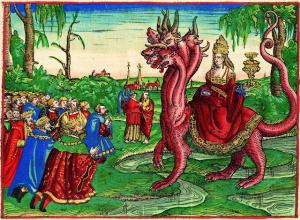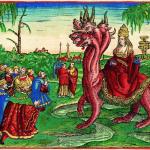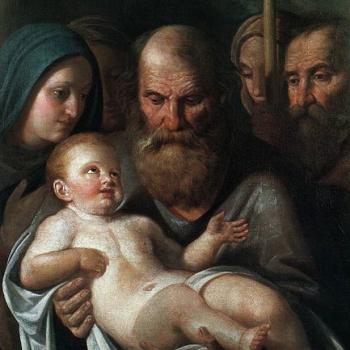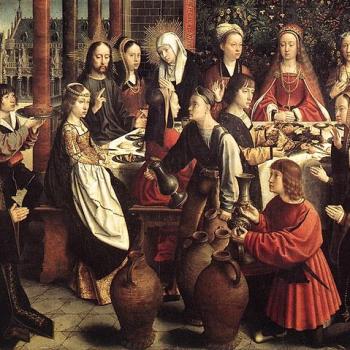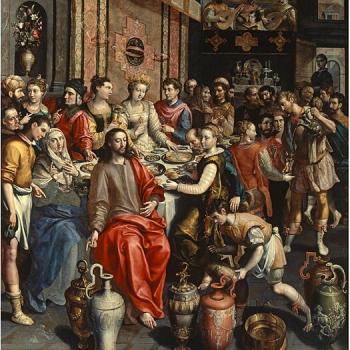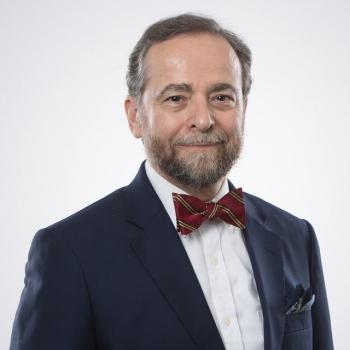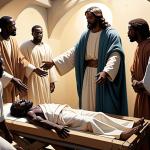Our Lady of Fatima
The late Steve Hays (1959-2020) was a Calvinist (and anti-Catholic) apologist, who was very active on his blog, called Triablogue (now continued by Jason Engwer). His 695-page self-published book, Catholicism — a collection of articles from his site — has graciously been made available for free. On 9 September 2006, knowing full well my history of being condemned and vilified by other anti-Catholics (and his buddies) like James White, Eric Svendsen, and James Swan, Hays was quite — almost extraordinarily — charitable towards me. He wrote then:
I don’t think I’ve ever accused him of being a traitor or apostate or infidel. . . . I have nothing to say, one way or the other, regarding his state of grace. But his sincerity is unquestionable. I also don’t dislike him. . . . I don’t think there’s anything malicious about Armstrong—unlike some people who come to mind. In addition, I don’t think I’ve ever said he was unintelligent. For the record, it’s obvious that Armstrong has a quick, nimble mind. . . . The term “apostasy” carries with it a heavy presumption that the apostate is a hell-bound reprobate. I think it’s unwarranted to assume that all Catholics or converts to Catholicism are damned.
Two-and-a-half years later, starting in April 2009 and up through December 2011 (in the following quotations) his opinion radically changed, and he claimed that I have “an evil character,” am “actually evil,” “ego-maniac, narcissist,” “idolater,” “self-idolater,” “hack who pretends to be a professional apologist,” given to “chicanery,” one who doesn’t “do any real research,” “a stalwart enemy of the faith . . . no better than [the atheists] Richard Dawkins or Christopher Hitchens,” with an intent to “destroy faith in God’s word,” “schizophrenic,” “emotionally unhinged,” one who “doesn’t trust in the merit of Christ alone for salvation,” “has no peace of mind,” “a bipolar solipsist,” “split-personality,” and a “bad” man. He wasn’t one to mince words! See more gory details.
I feel no need whatsoever to reciprocate these silly and sinful insults. I just wanted the record to be known. I’ve always maintained that Hays was a very intelligent man, but habitually a sophist in methodology; sincere and well-meaning, but tragically and systematically wrong and misguided regarding Catholicism. That’s what I’m addressing, not the state of his heart and soul (let alone his eternal destiny). It’s a theological discussion. This is one of many planned critiques of his book (see my reasons why I decided to do this). Rather than list them all here, interested readers are directed to the “Steve Hays” section of my Anti-Catholicism web page, where they will all be listed. My Bible citations are from the RSV. Steve’s words will be in blue.
*****
[Chapter 1: Miracles]
“Our Lady of Fatima”
I don’t have antecedent objections to angelic apparitions, apparitions of the dead, or visions of Jesus in church history. In a sense I don’t object to “saintly apparitions”. However, by that I mean, not individuals canonized by the church of Rome, [but] crisis apparitions in which a departed Christian might appear to a friend or relative who’s going through an ordeal to lend strategic, timely encouragement at a critical juncture in his life. [p. 50]
This is remarkably unProtestant and semi-Catholic. Hays has no blanket condemnation of ghosts and at least some kinds of apparitions and visions.
[I]n general, I don’t have the same epistemic duty to believe your reported observation than I have to believe my own observations. I’m not necessarily obligated to believe you. [p. 50]
This is a lot of the reason why the Catholic Church is very careful to distinguish private and public revelation. But I hasten to add that public revelation involves eyewitness testimony that was not witnessed firsthand by 100% of all the people alive today, either. We have to exercise faith in order to accept it, and don’t have 100% philosophic “certainty.”
I admit that I rule out Marian apparitions as a matter of principle. I don’t think Mary would appear to people because that usurps devotion to Jesus. Indeed, the Fatima cult is a classic example of Mary supplanting Jesus in the hearts of Catholic devotees. [p. 50]
He starts out reasonably, but now we see the irrationality of an inherent hostility to Mary. It makes no sense, before we even get to the particulars. Hays can conceptualize and accept “angelic apparitions” and these don’t constitute a threat to “devotion to Jesus.” Yet Mary (it appears) must do so — invariably, inherently does so — , in his mind. It’s a classic example of a fundamentally incorrect Protestant “either/or” dichotomous mindset.
And this will “hijack” his analysis from the beginning, because he starts with this false premise: any devotion or honor whatsoever directed towards Mary must constitute idolatry; it must and always mean Mary becomes an idol and takes the place of Jesus “in the hearts of Catholic devotees.” He can’t comprehend any other possible scenario. His false presuppositions don’t allow him to. He’s constitutionally unable to comprehend a non-idolatrous, non-worshipful veneration and honor of even someone as momentous and saintly as the Blessed Virgin Mary, the mother of Jesus, our Lord and Savior and Redeemer. It’s very sad.
And assuredly there are scriptural analogies. The dead Samuel appeared to Saul. Did that detract from “devotion to” God? No. It was God’s will. Samuel gave a true prophecy of Saul’s death the next day. Moses and Elijah appeared with Jesus at the Transfiguration. Did the disciples immediately start worshiping them instead of Jesus? No. Did they “supplant” Jesus in their hearts? No. And they didn’t worship them or make them their idols because there is no such necessity or inclination (save for a very few who go astray).
Many bodies rose from the tombs and started walking around Jerusalem after Jesus’ death (Matthew 27). Does the Bible inform us that everyone started worshiping and adoring them, too instead of God? No (and it certainly would have, if that had actually happened). God even shares His glory with His creatures (as the Bible massively reiterates). How many Protestants are aware of that, and the 26 Bible passages I brought to bear, to prove it beyond any doubt?
These are the sorts of clearly false premises that anti-Catholics (and many ecumenical Protestants) start out with, before they even think about and analyze Catholic beliefs that they reject (above all, our dreaded and despised beliefs about Mary: several of which their own Protestant founders shared). Unless they can be persuaded that their premises are false, they’ll never arrive at these truths. They can’t. It’s like traffic barriers that close off a certain road so that drivers can’t possibly use them. As the old saying goes, “the man convinced against his will retains his original belief still.”
Socrates (and often Jesus) examined people’s premises and presuppositions. That’s often (if not usually) where errors arise. I utilize the same method all the time, and have done so presently. A false notion is accepted on an inadequate basis and becomes the foundation of sand that a lousy unstable house of theology is built upon. The error must be critiqued and exposed at its root.
In effect, Hays then attempts some sort of answer to my objection:
A Catholic might object that I suffer from unfalsifiable skepticism regarding Marian apparitions. No kind of evidence would convince me otherwise. [p. 50]
Yes I would, and did!
In a sense that’s true, but keep in mind that there’s conflicting prima facie evidence. I can’t be equally and simultaneously open to the reputed revelations Muhammad, Swedenborg, Joseph Smith, and Lucia dos Santos. [p. 50]
Now he employs yet another fallacy: besmirching Fatima by associating it with false belief-systems that Catholics and Protestants alike reject. This won’t do, either.
Of course, that doesn’t mean we should discount all reports of supernatural encounters. But it does mean we must bring certain criteria to bear when sifting the putative evidence. [p. 50]
I totally agree. The Catholic Church fully agrees.
And that includes theological criteria (e.g. Deut 13:1-5). [p. 50]
That passage has no direct relevance to a purported apparition of Mary, as I explained in the previous installment. It simply doesn’t refute it. The only doctrine it mentioned is polytheism, where Catholics and Protestants are in full agreement.
[S]ome of the central claims narrow down to a single conduit: the testimony of Lucia. To my knowledge, there’s no independent corroboration for many of her claims. [p. 51]
Likewise, there was “no independent corroboration” of St. Paul having been spoken to by Jesus at his conversion. His companions heard noises but not the words spoken to Paul. There was “no independent corroboration” of God speaking to Abraham on several occasions, and “no independent corroboration” of God speaking to Moses in the burning bush. There was “no independent corroboration” of God speaking to Billy Graham and telling him to believe in the Bible and go preach based on its teachings.
There was “no independent corroboration” of St. Augustine’s experiences leading to his conversion to Catholic Christianity, or of St. Peter seeing the vision of “clean foods” or of Isaiah and Daniel seeing visions of God, or God Himself (take your pick), or the prophets when they (constantly) heard God’s instructions of what to proclaim. Shall I continue?
Hays employs hyper-skeptical atheist methodologies when he approaches “Catholic” topics, in a way that he never would when exactly the same thing applies to prominent biblical or Protestant or patristic figures, as just shown. It’s simply not a disproof. One can attempt to discredit a persons’ credibility, so that their report is suspect (as Hays briefly and unsuccessfully attempted to do with St. Padre Pio earlier in the book), but just because they alone witnessed something is not in and of itself inherently some sort of disproof or reason for the sort of unflinching doubt that Hays extends to Servant of God, Sister Lucia.
He obviously does so because (as he openly admitted) he “rule[s] out Marian apparitions as a matter of principle.” He can’t possibly believe what Lucia reported, with that beginning-point. He must find a way to discredit her report, because the apparition she saw can’t possibly be true (for inadequate reasons, in Hays’ oh-so-skeptical brain). The above attempt miserably fails at that task, too.
In addition, she wrote this down years after the fact. [p. 51]
So did the Gospel writers: the evangelists. Shall we therefore dismiss the Gospels, too? In consistency, we would have to. But one of the constants and hallmarks of anti-Catholicism is its inveterate, relentless double standards and viciously self-defeating propositions.
But even if Mary actually spoke to Lucia, unless Lucia was blessed with verbatim recall, what we’re getting isn’t a statement in Mary’s own words, but in Lucia’s own words. [p. 51]
As in all other such “sole individual” reports, such as the several I mentioned above . . . Again, this is how atheists habitually argue about the Bible itself. Hays draws from a “page” in their antics and directs it inconsistently towards Catholics only.
There’s also the vexed question of how you’d verify a Marian apparition even if you had direct experience of a putative Marian apparition. [p. 51]
There’s also the vexed question of how you’d verify the burning bush [Moses] or the three angels [who appeared to Abraham] or Jesus telling a person to stop persecuting Him [Paul’s conversion] or a vision of being caught up to heaven [Paul] or of the clean foods [Peter] or of any number of Protestant personal conversions involving a profound experience or various spiritual experiences one individual has [I experienced a horrifying vision of hell right before I embarked on my Protestant campus evangelism ministry in 1985], or “after-death” experiences of heaven.
Over 500 people saw the risen Jesus. But how is that “verified” today in the seeming exactitude that Hays demands for Fatima? Atheists simply dismiss it without further thought, as a fairy tale report of an imaginary wish. How is it absolutely proven? It can’t be. It requires faith. Christianity does not consist solely of reason, after all. Hays almost acts as if it does. The excellent Protestant philosopher / apologist Gary Habermas (whom Hays mentioned earlier as having read a section of his book for advisory purposes) just put out a huge defense of Jesus’ resurrection. Only Christians are impressed. Atheists always find a “way” to dismiss any and all such arguments. And to do so, they argue almost exactly as Hays does when trashing Fatima and all Marian apparitions.
But once we grant the realm of the supernatural, there are other candidates who could presumably impersonate Mary. What about a malevolent ghost or fallen angel? [p. 51]
But if so, they wouldn’t tell the truth in the prophecies, as Mary did at Fatima (many things clearly came true in these prophecies or “secrets”). Demons can’t and won’t do that. Like the real Samuel who appeared to Saul (that many Protestants claim was merely an impersonating demon: the Bible says no such thing) and gave a true prophecy, likewise, Mary gives true prophecies, and did so at Fatima. Again, demons don’t do that.
We know how the devil (and by extension, his followers, the demons) speak, by reading his words spoken in the Garden of Eden and with God in the book of Job, or with Jesus at the temptation in the wilderness. C. S. Lewis nailed “demon-speak” in his masterful Screwtape Letters. What Mary said at Fatima is as different in content and spirit from those things as east is from west, or dry is from wet. Mary talks about how souls can be saved. Demons are gonna do that?
If we take the reports at face value, Mary is quite the linguist. She speaks so many different foreign languages, depending on the audience. Does she speak foreign languages with an Aramaic accent? [p. 51]
Well, Paul wrote:
1 Corinthians 13:9-12 For our knowledge is imperfect and our prophecy is imperfect; [10] but when the perfect comes, the imperfect will pass away. [11] When I was a child, I spoke like a child, I thought like a child, I reasoned like a child; when I became a man, I gave up childish ways. [12] For now we see in a mirror dimly, but then face to face. Now I know in part; then I shall understand fully, even as I have been fully understood.
I think “perfect” knowledge and “understand[ing] fully” is an awful lot of knowledge. Languages would be part of this perfect and full understanding and knowledge, and far more than that! What must certainly be our extraordinary knowledge in heaven is hardly fit to be fodder for mockery and belittling. Hays is again being most unbiblical in his rush to always denigrate Mary at all costs. Somehow Moses and Elijah could speak to Jesus, even though their language (from some 1300 and 900 or so years before Jesus) would have been very different. The earliest Aramaic inscriptions date from the 11th century BC: at least a hundred years after Moses’ death.
Language is never a barrier in the Bible that I can recall. God has a way to deal with that, when messages are being proclaimed. So why does Hays find it amusing and not fit for belief that Mary would be able to speak Portugese at Fatima? Wouldn’t that be part of the perfect knowledge and full understanding that all in heaven will be granted by the mercy and power of God?
By the same token, why are major Marian apparitions confined to Catholic witnesses? [p. 51]
I imagine it’s because God knows the entrenched, anti-reason, false-premise-laden mindset that many or most Protestants have about Mary. They simply would dismiss it out of hand, just as Hays has done. So they happen among people who are open to accepting and believing them. As the Bible stated about Jesus: “And he did not do many mighty works there, because of their unbelief” (Mt 13:58).
And that’s all Hays could come up as a “refutation” of the events at Fatima! I thought he was just beginning and all of a sudden this section ended. He has offered nothing whatsoever that casts any legitimate, unquestionable doubt upon what has been reported about the apparitions at Fatima. Literally all he did was play the atheist hyper-skeptical game about everything, and that won’t do at all, because the same mindset takes out the Bible, too.
It’s very shoddy and inadequate thinking. But we have come to always expect that from anti-Catholics, trying in vain to rationalize and explain away All Things Distinctively Catholic. It’s a pathetic, embarrassing enterprise, and never difficult to refute (even to refute from the Bible, as well as by logic).
***
Practical Matters: Perhaps some of my 4,200+ free online articles (the most comprehensive “one-stop” Catholic apologetics site) or fifty-one books have helped you (by God’s grace) to decide to become Catholic or to return to the Church, or better understand some doctrines and why we believe them.
Or you may believe my work is worthy to support for the purpose of apologetics and evangelism in general. If so, please seriously consider a much-needed financial contribution. I’m always in need of more funds: especially monthly support. “The laborer is worthy of his wages” (1 Tim 5:18, NKJV). 1 December 2021 was my 20th anniversary as a full-time Catholic apologist, and February 2022 marked the 25th anniversary of my blog.
PayPal donations are the easiest: just send to my email address: apologistdave@gmail.com. You’ll see the term “Catholic Used Book Service”, which is my old side-business. To learn about the different methods of contributing, including 100% tax deduction, etc., see my page: About Catholic Apologist Dave Armstrong / Donation Information. Thanks a million from the bottom of my heart!
***
Photo credit: The Whore of Babylon (workshop of Lucas Cranach): colorized illustration from Martin Luther’s 1534 translation of the Bible [public domain / Wikimedia Commons]
***
Summary: The late Steve Hays was a Calvinist and anti-Catholic writer and apologist. This is one of my many critiques of Hays’ “Catholicism”: a 695-page self-published volume.


